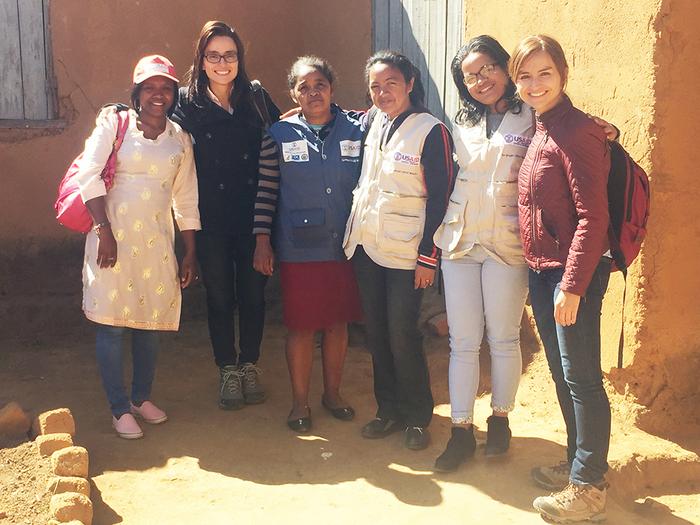URBANA, Ill. – Madagascar is one of the poorest countries in the world and access to health care is limited for many people. Childhood vaccinations are a crucial component of preventative care, but vaccination rates remain below the World Health Organization’s goal of reaching 95% of children. A new study from the University of Illinois Urbana-Champaign examines the effectiveness of a health intervention program that enlists community-based health workers to promote child vaccination uptake.

Credit: College of ACES.
URBANA, Ill. – Madagascar is one of the poorest countries in the world and access to health care is limited for many people. Childhood vaccinations are a crucial component of preventative care, but vaccination rates remain below the World Health Organization’s goal of reaching 95% of children. A new study from the University of Illinois Urbana-Champaign examines the effectiveness of a health intervention program that enlists community-based health workers to promote child vaccination uptake.
“Childhood vaccinations are a cost-effective investment that can have large ripple effects. Vaccines can reduce child mortality and improve health outcomes, which leads to further socio-economic benefits. It’s important to learn how we can improve vaccination uptake and what the barriers are,” said Catalina Herrera-Almanza, assistant professor in the Department of Agricultural and Consumer Economics, part of the College of Agricultural, Consumer and Environmental Sciences at Illinois. She is one of the two authors of the study, published in World Development.
Herrera-Almanza and co-author Maria Rosales-Rueda, assistant professor of economics at Rutgers University, analyzed the effects of Santanet2, a large-scale health intervention program that relied on community-based health workers in remote areas of Madagascar.
Santenet2 was funded by the United States Agency for International Development (USAID) and implemented in collaboration with the national government and local NGOs. During its rollout from 2009 to 2011, the program reached 11 million people, about half of the country’s population.
“In Madagascar, 65% of people live five kilometers or more from a primary health center. In this context, having community health workers who can provide basic services and information is very important. The program trained two community health workers in each village, one focusing on maternal health and the other on child health,” Herrera-Almanza explained. “These workers are unpaid volunteers who are motivated by a desire to help their local community.”
Childhood vaccinations, including polio, diphtheria, and measles, are recommended for all infants. The community workers did not administer vaccines, but they informed families about vaccination campaigns and schedules and encouraged them to participate.
“If you live in a very remote place with limited access to infrastructure, roads, and information, you don’t know when or where there is going to be a vaccination campaign, so these community health workers were really mobilizing the community,” Herrera-Almanza said.
The researchers analyzed data before, during, and after Santanet2’s implementation. They combined information about program rollout with a nationally representative household survey and geocoded information about public health facilities.
When comparing communities with and without the program, they found no effect overall. However, when they looked at only the most remote villages, located 10 kilometers or more from health centers, there was a significant increase in vaccination rates.
“People who live closer to the health centers may already have the information they need. We know vaccination rates decrease rapidly the further you are from the health center. Our results showed community health workers really improved vaccination uptake in the most remote areas. Basically, the people who benefit the most from these programs are those living the farthest away,” she added.
Next, the researchers aimed to identify characteristics of households that benefited from the program. They found no effect of maternal education or poverty level; however, the mother’s religious affiliation had a significant effect on vaccination rates.
“We found households that identify as Catholic or Protestant were more reluctant to vaccinate their children. This is about 60% of the sample, so it is an important group. We can’t say from these data why that is the case. Perhaps religious affiliation is associated with skepticism towards vaccinations, or it could simply be due to the influence of social networks,” Herrera-Almanza said.
The researchers concluded the program was effective in reaching those who needed it the most. They also pointed out that even if there is infrastructure and resources to administer vaccines, there may be additional barriers such as religious or social group affiliation that need to be addressed in future programs.
The paper, “Community-based health programs and child vaccinations: Evidence from Madagascar,” is published in World Development [DOI: 10.1016/j.worlddev.2023.106322]. Funding support was provided by the Population Reference Bureau and the Hewlett Foundation.
Journal
World Development
DOI
10.1016/j.worlddev.2023.106322
Method of Research
Data/statistical analysis
Subject of Research
Not applicable
Article Title
Community-based health programs and child vaccinations: Evidence from Madagascar
Article Publication Date
7-Jun-2023




